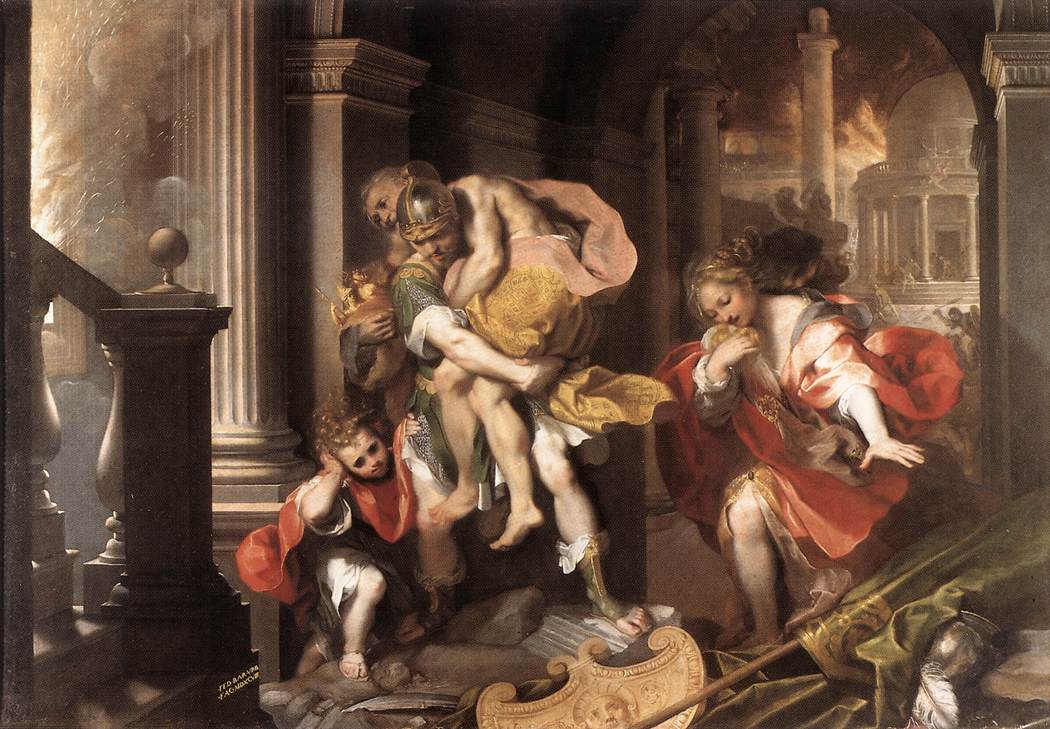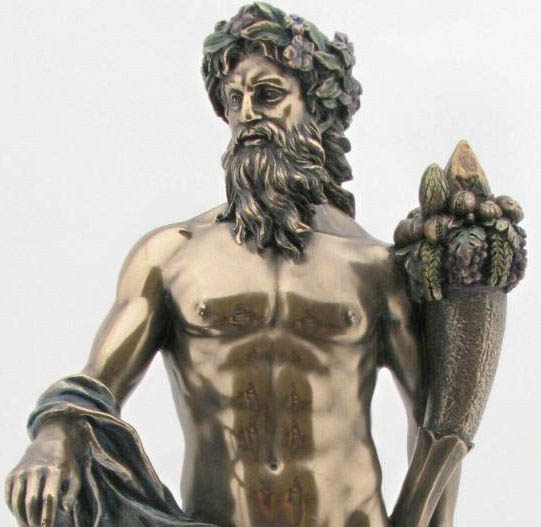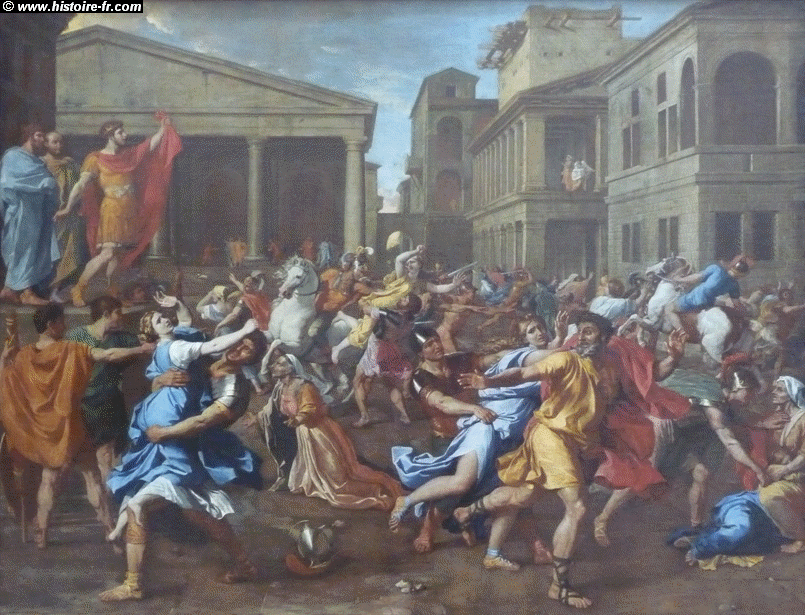Æneas, the great ancestor of Romulus

When the Trojan war broke out Aeneas didi not participate , he was jealous of the favors that King Priam to other younbg men that he himself was underlooked and that the services he rendered was undervalued, During the war he remained at his home among the mountains with his sheeps In fact Archilles one of the greek warriors attacked him in search for food and provisions . Aeneas anger against the greeks aroused the Dardanians to fight against the greeks ..in the end

Aeneas led the Dardanians and became active in the war

After the greeks burned the city of Troy he seek a new place to live until he found Latium a mountainous place near Tiber River until his descendants Romulos an Remus creatred the city of Rome


.

SURVIVAL AFTER BURNING OF TROY AT NEW PLACE CALLED ROME


Romulus commenced the building of Rome. The difficulty arises from the fact, that no regular records of public events were made in those ancient days. In modern times such records are very systematically kept,—an express object of them being to preserve and perpetuate a knowledge of the exact truth in respect to the time, and the attendant circumstances, relating to all great transactions. On the other hand, the memory of public events in early periods of the world, was preserved only through tradition; and tradition cares little for the exact and the true. She seeks only for what is entertaining. Her function being simply to give pleasure to successive generations of listeners, by exciting their curiosity and wonder with tales,—which, the more strange and romantic they are, the better they are suited to her purpose—she concerns herself very little with such simple verities as dates and names. The exposure of the twin infants of Rhea, supposing such an event to have actually happened, she remembered well, and repeated the narrative of it—adorning it, doubtless, with many embellishments—from age to age, so that the whole story comes down to modern times in full detail; but as to the time when the event took place, she gave herself no concern. The date would have added nothing to the romance of the story, and thus it was neglected and forgotten.
the constructions which Romulus and his companions made were of a very rude and simple character; such as might have been expected from a company of boys: for boys we ought perhaps to consider them all, since it is not to be presumed that the troop, in respect to age and experience, would be much in advance of the leaders. The wall which they built about the city was probably only a substantial stone fence, and their houses were huts and hovels. Even the palace, for there was a building erected for Romulus himself which was called the palace, was made, it is said, of rushes. Perhaps the meaning is that it was thatched with rushes,—or possibly the expression refers to a mode of building sometimes adopted in the earlier stages of civilization, in which straw, or rushes, or some similar material is mixed with mud or clay to help bind the mass together, the whole being afterward dried in the sun. Walls thus made have been found to possess much more strength and durability than would be supposed possible for such a material to attain.

"We have now," said Romulus, "completed the building of our city, so far as at present we are able to do it; and it must be confessed that if we were required to depend for protection against a serious attack from an enemy, on the height of our walls, or on their strength and solidity, our prospects would not be very encouraging. But our walls we must remember are not what we rely upon. No walls can be so high, that an enemy can not scale them. The dependence must be after all on the men within the city, and not on the ramparts and entrenchments which surround it, whatever those ramparts and entrenchments may be. We must therefore rely upon ourselves, for our safety—upon our valor, our discipline, our union and harmony. It is courage and energy in the people, not strength in outward defenses, on which the safety and prosperity of a State must depend.
 The first object to which he gave his attention was the organization of the people, and the framing of the general constitution of society. The community over which he was called to preside had consisted thus far of very heterogeneous and discordant materials. Vast numbers of the people were of the humblest and most degraded condition, consisting of ignorant peasants, some stupid, others turbulent and ungovernable; and of refugees from justice, such as thieves, robbers, and outlaws of every degree. But then, on the other hand, there were many persons of standing and respectability. The sons of families of wealth and influence in Alba had, in many cases, joined the expedition, and at last, when the building of the city had advanced so far as to make it appear that the enterprise might succeed, more men of age and character came to join it, so that Romulus found himself, when he formally assumed the kingly power, at the head of a community which contained the elements of a very respectable commonwealth. These elements were, however, thus far all mingled together in complete confusion, and the work that was first to be done was to adopt some plan for classifying and arranging them
The first object to which he gave his attention was the organization of the people, and the framing of the general constitution of society. The community over which he was called to preside had consisted thus far of very heterogeneous and discordant materials. Vast numbers of the people were of the humblest and most degraded condition, consisting of ignorant peasants, some stupid, others turbulent and ungovernable; and of refugees from justice, such as thieves, robbers, and outlaws of every degree. But then, on the other hand, there were many persons of standing and respectability. The sons of families of wealth and influence in Alba had, in many cases, joined the expedition, and at last, when the building of the city had advanced so far as to make it appear that the enterprise might succeed, more men of age and character came to join it, so that Romulus found himself, when he formally assumed the kingly power, at the head of a community which contained the elements of a very respectable commonwealth. These elements were, however, thus far all mingled together in complete confusion, and the work that was first to be done was to adopt some plan for classifying and arranging them
the organization and the institutions which in subsequent times appeared in the Roman state, were not deliberately planned and formally introduced by Romulus at the outset, but that they gradually grew up in the progress of time, and that afterward historians and philosophers, in speculating upon them at their leisure, carried back the history of them to the earliest times, in order, by so doing, to honor the founder of the city, and also to exalt and aggrandize the institutions themselves in public estimation, by celebrating the antiquity and dignity of their origin.

The institutions which Romulus actually founded, were of a very republican character, if the accounts of subsequent writers are to be believed. He established, it is true, a gradation of ranks, but the most important offices, civil and military, were filled, it is said, by election on the part of the people. In the first place, the whole population was divided into three portions, which were called tribes, which word was formed from the Latin word tres, meaning three. These tribes chose each three presiding officers, selecting for the purpose the oldest and most distinguished of their number. It is probable, in fact, that Romulus himself really made the selection, and that the action of the people was confined to some sort of expression of assent and concurrence for it is difficult to imagine how any other kind of election than this could be possible among so rude and ignorant a multitude. The tribes were then subdivided each into thirty counts or counties, and each of these likewise elected its head. Thus there was a large body of magistrates or chieftains appointed, ninety-nine in number, namely, nine heads of tribes and ninety heads of counties. Romulus himself added one to the number, of his own independent selection, which made the hundredth. The men thus chosen, constituted what was called the senate. They formed the great legislative council of the nation. They and the families descending from them became, in subsequent times, an aristocratic and privileged class, called the Patricians. The remaining portion of the population were called Plebeians.
 The Plebeians comprised, of course, the industrial and useful classes, and were in rank and station inferior to the Patricians. They were, however, not all upon a level with each other, for they were divided into two great classes, called patrons and clients. The patrons were the employers, the proprietors, the men of influence and capital. The clients were the employed, the dependent, the poor. The clients were to perform services of various kinds for the patrons, and the patrons were to reward, to protect, and to defend the clients. All these arrangements Romulus is said to have ordained by his enactments, and thus introduced as elements in the social constitution of the state. It is more probable, however, that instead of being thus expressly established, by the authority of Romulus as a lawgiver, they gradually grew up of themselves, perhaps with some fostering attention and care on his part, and possibly under some positive regulation of law. For such important and complicated relations as these are not of a nature to be easily called into existence and action, in an extended and unorganized community, by the mere fiat of a military chieftain.
The Plebeians comprised, of course, the industrial and useful classes, and were in rank and station inferior to the Patricians. They were, however, not all upon a level with each other, for they were divided into two great classes, called patrons and clients. The patrons were the employers, the proprietors, the men of influence and capital. The clients were the employed, the dependent, the poor. The clients were to perform services of various kinds for the patrons, and the patrons were to reward, to protect, and to defend the clients. All these arrangements Romulus is said to have ordained by his enactments, and thus introduced as elements in the social constitution of the state. It is more probable, however, that instead of being thus expressly established, by the authority of Romulus as a lawgiver, they gradually grew up of themselves, perhaps with some fostering attention and care on his part, and possibly under some positive regulation of law. For such important and complicated relations as these are not of a nature to be easily called into existence and action, in an extended and unorganized community, by the mere fiat of a military chieftain. Romulus, in the course of his reign, laid the foundation of the future greatness and glory of Rome, by the energy with which he acted in introducing order, system, and discipline into the community which he found gathered around him. He seems to have had the sagacity to perceive from the outset that the great evil and danger which he had to fear was the prevalence of the spirit of disorder and misrule among his followers. In fact, nothing but tumult and confusion was to have been expected from such a lawless horde as his, and even after the city was built, the presumption must have been very strong in the mind of any considerate and prudent man, against the possibility of ever regulating and controlling such a mass of heterogeneous and discordant materials, by any human means. Romulus saw, however, that in effecting this purpose lay the only hope of the success of his enterprise, and he devoted himself with great assiduity and care, and at the same time with great energy and success, to the work of organizing it. The great leading objects of his life, from the time that he commenced the government of the new city, were to arrange and regulate social institutions, to establish laws, to introduce discipline, to teach and accustom men to submit to authority, and to bring in the requirements of law, and the authority of the various recognized relations of social life, to control and restrain the wayward impulses of the natural heart.
Romulus, in the course of his reign, laid the foundation of the future greatness and glory of Rome, by the energy with which he acted in introducing order, system, and discipline into the community which he found gathered around him. He seems to have had the sagacity to perceive from the outset that the great evil and danger which he had to fear was the prevalence of the spirit of disorder and misrule among his followers. In fact, nothing but tumult and confusion was to have been expected from such a lawless horde as his, and even after the city was built, the presumption must have been very strong in the mind of any considerate and prudent man, against the possibility of ever regulating and controlling such a mass of heterogeneous and discordant materials, by any human means. Romulus saw, however, that in effecting this purpose lay the only hope of the success of his enterprise, and he devoted himself with great assiduity and care, and at the same time with great energy and success, to the work of organizing it. The great leading objects of his life, from the time that he commenced the government of the new city, were to arrange and regulate social institutions, to establish laws, to introduce discipline, to teach and accustom men to submit to authority, and to bring in the requirements of law, and the authority of the various recognized relations of social life, to control and restrain the wayward impulses of the natural heart.
Walang komento:
Mag-post ng isang Komento